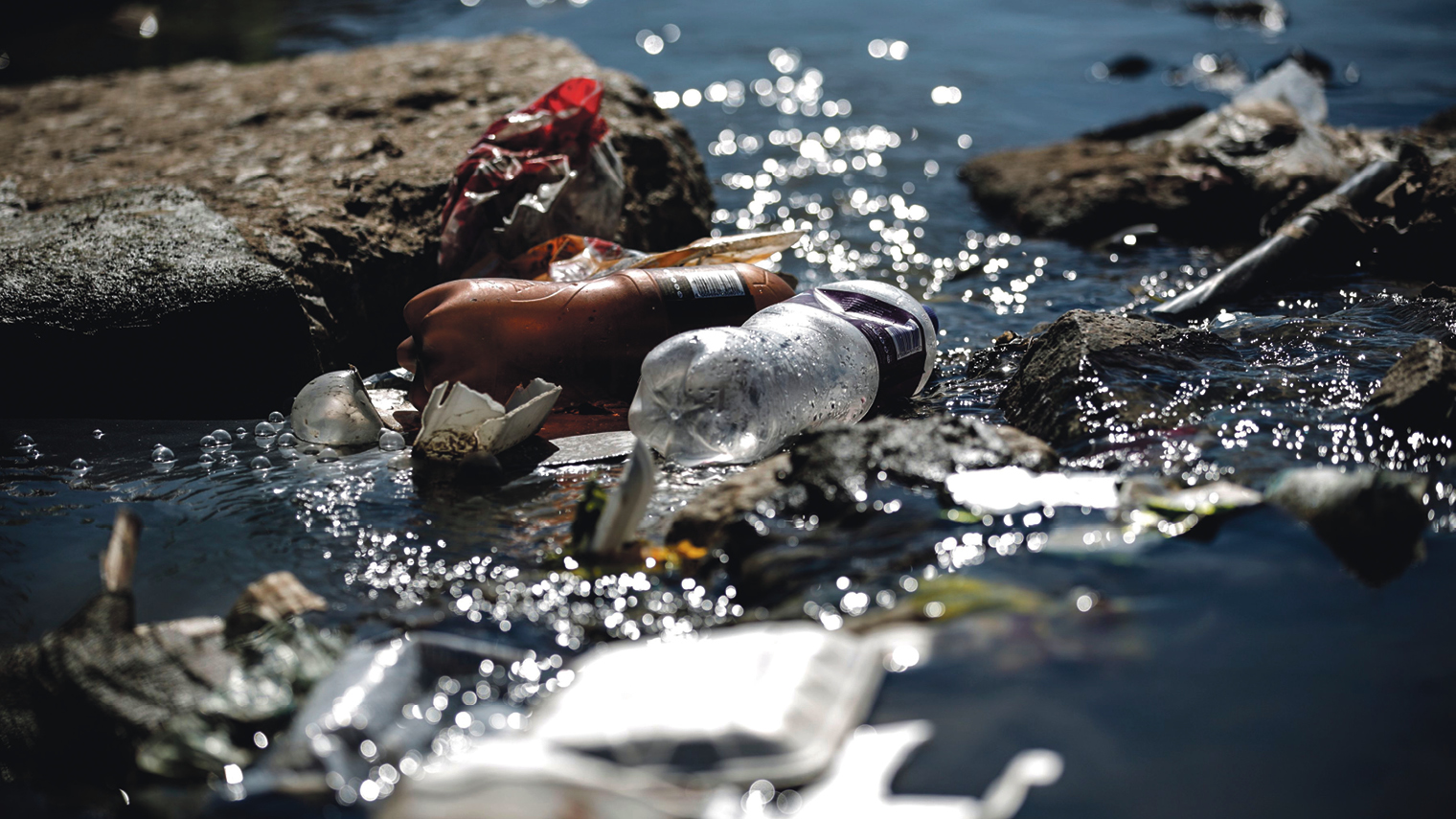 Insight
Insight


Profit-for-purpose organisation ClimateCare is creating mini economies that deliver social and environmental benefits in hard-to-reach areas.
Whether we like it or not, plastic is useful, it’s versatile and it’s everywhere, used daily to keep food fresh, make contactless payments, hold shopping and to brush our teeth. Yet, despite a turning point in public attitudes towards waste, plastic continues to litter streets, rivers and oceans, and is causing irreversible damage to the planet. As organisations react to this growing consumer concern, impact investing offers opportunities to commercialise a much-needed global clean-up.

From the shocking scenes of Blue Planet II to global campaigns against single-use straws and disposable coffee cups, the public is waking up to the impact that plastic can have on the environment. But while a reduction in demand for excessive packaging may have a small impact at the source, prompting food and drink manufacturers to curtail their use of unnecessary material, the sheer amount of plastic leakage into the Earth’s oceans continues to grow.
According to the Ellen MacArthur Foundation, 32 per cent of plastic packaging escapes collection systems worldwide and, if current trends continue, the weight of plastic in the oceans could surpass the weight of fish by 2050.
Numerous high-profile projects have been set up to scour the oceans for plastic in an effort to mitigate its impact. Making ocean clean-ups profitable, however, is another matter and could represent the Holy Grail for those interested in impact investing, delivering a measurable benefit to the planet while making a financial return.
ClimateCare, ranked the number-one B corp in the UK, and as such committed to rigorous standards of social and environmental performance, accountability and transparency, wants to do just that. It is developing a surprisingly simple way to commercialise the recycling of ocean-bound plastic waste in problem areas such as Nairobi and Dhaka, where rivers are constantly swamped with rubbish and drainage systems are choked with discarded material.
Much like deposit return schemes trialled elsewhere, local rubbish pickers will be paid in cash to retrieve plastic destined for rivers and hand it over to networks of recycling centres. Once recycled into pellets, companies are then encouraged to buy the materials to reuse as part of their supply chain requirements.
The plastic pellets are then sold at a fixed price to corporates, with profits split between ClimateCare and impact investing partners, typically high-net-worth individuals, who invested initially to get the project off the ground.
“Our job is to deliver impact,” says ClimateCare’s chief executive Edward Hanrahan. “We try and create that loop where the projects deliver benefits for both society as a whole and the end-consumer or corporate that would have otherwise had to pay for the impact anyway.”
The incentives for corporates are clear, Mr Hanrahan says. They are taking plastic out of the system at a fixed price through long-term contracts and don’t have to rely on virgin polymers, securing themselves against the potential costs from impending plastic legislation worldwide.
Then there’s the obvious reputational benefit of impact investing. “Each piece of plastic has a trackable provenance on it, so you can know which project it came from or which river it didn’t enter,” he says.
“What corporates have to understand is that they have a role in causing these large societal issues. They need to size their own impact and take a commensurate level of responsibility. Our job is to help them do that and deliver it as cost effectively as possible for them.
“Supporting our programmes helps businesses manage risk, take responsibility for their climate and social impacts, and engage staff and stakeholders with a CSR [corporate social responsibility] programme that delivers measurable, independently verified outcomes.”
Meanwhile, giving those below the poverty line a living wage not only improves access to education and financial inclusion, it also builds self-serving local economies.
“There’s a great opportunity to pay people on the ground to pick up the plastic where there are no waste management systems in place, creating a model where members in the community start to produce less waste and earn a living wage.”
ClimateCare, founded 21 years ago, has so far deployed more than $100 million to deliver social and environmental impacts, and was originally set up to invest in carbon asset development programmes, creating markets for generating and selling carbon credits to corporations.
In a typical project, investors and concessionary finance provide the upfront capital to kick-start projects, which are either set up by local entrepreneurs or ClimateCare itself. These projects are helped off the ground and, once up and running, are commercialised through the sale of “outcomes” – recycled plastic pellets or carbon credits – at the highest possible price to corporations or governments looking to offset their own plastic usage or emissions.
“If corporates don’t want to invest upfront in projects or take any risk, there’s a role for impact investors to come in and provide that upfront capital and then we commercialise on the other end,” Mr Hanrahan explains.
The organisation is working on a number of projects that also deliver multiple outcomes, tackling poverty, improving health and protecting the environment simultaneously. One such project is aimed at reducing the reliance in developing markets on open fires or inefficient stoves to cook food or heat homes, an everyday occurrence for more than three billion people worldwide.
In Ghana’s capital, Accra, ClimateCare is working with a local business to scale up production of the CookMate, an efficient stove that uses up to 50 per cent less wood and charcoal than the average stove, partly due to its “pot skirt” design, ensuring heat is delivered directly to the pot.
In addition to easing fuel bills and reducing the pressure on the country’s rapidly deteriorating forests, CookMates create fewer smoky fumes that lead to indoor air pollution, which kills 13,000 people across Ghana each year. By slashing the time spent collecting fuel and cooking, tasks often performed by women, the project is also helping tackle gender inequality by reducing unpaid worktime for women. Meanwhile, a new factory has been built to produce the stoves, creating job opportunities for surrounding communities.
In total, the CookClean project is expected to help 300,000 families across Ghana by 2020, reducing carbon emissions by 130,000 tonnes a year. Carbon credits generated by the project are sold to either corporates or governments, and profits are either realised by investors or reinvested in the project.
“At the end of the day the financial elements around it for the corporate are less important than the fact that it is a real avoided emission, a real public health improvement or a real tonne of plastic taken out of ocean-bound supply,” says Mr Hanrahan.
“What that does is it moves from the old aid model of payment upfront, where the public sector [or corporate] is taking the risk of delivery, to a payment-for-outcomes model. This results-based finance method removes the risk of non-delivery or wasted aid from the public sector and moves it to the private sector. I think that is a big opportunity for the social-impact world where aid or subsidies can be paid at the end.”
So what advice would Mr Hanrahan give those thinking about impact investing? While there are lots of new technologies and exciting innovations out there looking for investment, “many of the solutions needed on the ground are low tech or proven tech”, he says.
“You absolutely have to consider an impact investment in the same way you would consider any mainstream investment. Look at the track record of the company you are investing in, the management team, and the ability to deliver both the impacts and the return on investment. To deliver maximum impact you should look at tried-and-tested mechanisms that are proven in the market and can deliver measurable positive outcomes at scale.”
Originally published here.